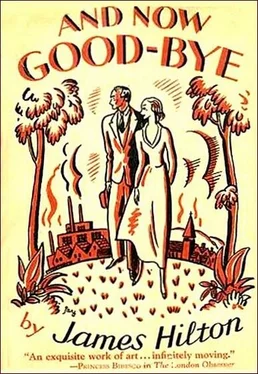But they had reached the concert-hall and the uniformed commissionaire was holding open the taxi-door.
As soon as he was settled comfortably in his seat he wanted to laugh. He felt so happy, and he had been anticipating this moment of settlement for so long, and the people all around him looked so very solemn, and the girl at his side stared ahead with such radiant eagerness at the sleek grand piano on the platform. The Cavendish was one of the older concert halls, and gazing round at its chocolate and gold decorations he said: “This is nearly as ugly as my chapel, isn’t it?”—“Rather uglier, if anything, I think,” she replied, and the retort pleased him obscurely and made him want to laugh more than ever.
But soon they found something definitely merrymaking, for the printed programme contained a series of verbal descriptions and interpretations of the music, such as—“Now all the noontide rapture and pulsating vitality of the preceding movement have given place to a calm twilight atmosphere in which the soul begins to glimmer like a star”; and they made the sudden mutual discovery that this was the sort of thing that amused them both intensely. For the next few minutes it seemed a pity to do anything but rummage through their programmes with occasional remarks of “Oh, do read this—it’s better still!”—until they became so uproarious that people near them began to look round reprovingly. “Really,” he exclaimed at last, after laughing a great deal, “is this a proper mood for approaching great music?”—and she answered: “Yes, I think it is—much better, anyhow, than the mood of the person who wrote that programme stuff.” He responded: “Yes, yes—oh, yes,” with almost worshipful eagerness; he knew what she meant, and it was somehow deep with all kinds of meanings that were his also.
“It would be much more intelligent to call music just a nice noise, as a child might,” she said.
“I agree. These attempts to describe tunes in words are ridiculous. You can’t ever be sure what a composer means.”
“Why should he mean anything at all? Isn’t the nice noise that he invents reason enough?”
“Reason enough for us, but is it his reason? Why does he compose?”
“Because he feels like it, or because it’s his job. Or, most often perhaps, because he can’t help it.”
“The person who wrote these programme notes would think your reasons very unromantic.”
“I think they’re tremendous reasons. Especially to do something because you can’t help doing it.”
“Yes, I think I’ve had that feeling myself at odd times.”
“When you first became a minister, I suppose?”
He seemed puzzled for a moment. “No doubt,” he replied at length. “But that wasn’t really in my mind. I was thinking of once or twice when I’ve tackled music composition.”
“You’ve composed?” she queried, her eyes showing more surprise than her words.
“Only a little. When I was younger I was very keen.”
“What did you compose?”
“Songs, hymn-tunes, all sorts of things. I once won ten pounds for a string quartet. That was my biggest hit.”
“Where was that?”
“At a musical festival in East London. I had the pleasure of hearing my quartet played once, very badly, at a special festival concert; that was twenty odd years ago, and I’m fairly certain it’s never been heard anywhere since.”
“It must have been pretty good.”
“It wasn’t bad, I admit. But it wasn’t very good, either. I won the prize because the others were worse.”
“I’d like to know more about it. I never guessed you’d done that sort of thing.”
“Well, I never guessed you were interested in music at all.”
“I know. It was a pity.”
And while he was pondering on what exactly she meant or could mean by that, the pianist and violinist appeared on the platform and the audience broke into applause. The first item was the Kreutzer Sonata, and from the very opening notes Howat had the impression of never having heard it, or even any music, before. He was amazed and a little awed by the feeling; it was terrifying, this acuteness of perception that had come over him—something beyond his mastery, threatening to engulf him in a flood of turbulent sensation, and though he could not identify it with anything known or imagined, yet during the Andante movement it rose in him to such a curious ache that but for the girl at his side and the thought of making a disturbance he might have left the hall. He gripped with his hands tightly on the arm-rests and commanded himself not to be so foolish, so overcome; it was absurd that even music should create such emotional tumult; but it was not the music alone, he explained to himself, but the strange sequence of events that had been happening all day. To-morrow, anyhow, he reflected, would see him reduced to his normal temperature; to-morrow, walking down the slope at Browdley Station, he would step into his old accustomed groove. But the final presto movement swept him out of all such reassurance into a world in which even thought could not be resolved into words, or even feeling into thought. Only the applause at the finish wakened him to reality. He felt dazed, then, and exhausted, as if he had been fighting some secret battle all alone.
The girl, fresh and confidant, turned to him immediately. They discussed the Kreutzer performance for a time, and then she wanted to know more, in detail, about composing work. He told her, as well as he could, and she listened with grave attention. “Why don’t you do any of it now?” she asked, afterwards.
“I do, occasionally. I put in an hour or two only this last week—trying a song for the school Christmas concert.”
“But you’ve given up your big ambitions?”
“Oh, entirely.”
“Is it because you don’t think any more that you could do anything big? Don’t you think it’s in you to do it?”
He pondered and replied slowly: “Honestly, I don’t know for certain, but I should say probably not. I was far too ambitious years ago, that’s obvious. Of course I have a certain amount of talent—it could perhaps be developed if I had the time. But I haven’t the time, and never will have, so really it’s not much use thinking about it, is it?”
“I believe,” she said, thoughtfully, “that these things usually work themselves out in the right way. I mean, if there is great stuff in anyone, it does come out—it has to—nothing else can happen. One would just give up everything for it. The same old reason—doing something because you can’t help doing it.”
He smiled. “Very well, when you hear that I’ve given up my pastorate in Browdley to go and compose string quartets in some garret in Chelsea, or wherever they do compose them, you can assume that I’ve done it because I couldn’t help doing it.”
The programme then continued. The pianist played a Schumann group; next followed the Brahms A Major Piano and Violin Sonata.
Howat had hoped all along that they would play this, and its name on the programme had set a further seal upon the perfection of the evening. Now, as it began, he fell into a second storm of emotion, but he did not, as during the Kreutzer, attempt resistance; he let himself be carried along the crest of the flood-tide and, at the end, found himself tranquil, though in a strange harbour. He could not collect his thoughts for a time, but it was the end of the concert and people were already chattering and shuffling out of their seats. He rose with his companion and joined the crowd streaming to the exits; “I like that Brahms,” he said, soberly; and she answered: “So do I.” There came a point in experience, he reflected (and he felt that she realised it also), when understatement was the less absurd of alternatives. When they were halfway to the doors renewed applause brought on the performers again; they played a short encore piece—some little modern thing which Howat did not know and did not particularly care for either. Nor did she; and he thought: How I like that way she has of being so effortlessly cool and downright—the way she says ‘I like this’ or ’I don’t care .for that’—with her eyes clear as crystal and her nose in the air like some high-spirited thoroughbred. But there was something warm and excited behind the crystal coolness, and in the lobby outside the hall she suddenly took his arm and exclaimed: “I don’t want to go in yet—it’s quite early. Are you tired? Do you want to go back to your hotel?”
Читать дальше











